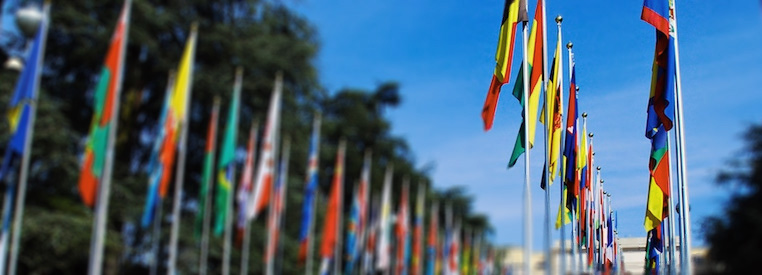On 11-12 October 2006, governmental representatives from 24 countries gathered in Vilnius, Lithuania, at the invitation of the Foreign Minister of Lithuania, for the twenty-ninth annual colloquium on human rights policy.
Colloquium 2006 | Vilnius, Lithuania | Agenda
Skip to a section:
- UN human rights reform and the initial experience of the Human Rights Council
- Human rights and dignity of persons with disabilities: Prospects for comprehensive convention
- Human rights in Lebanon and Israel
- What is the future of the “war on terror”?
I. UN HUMAN RIGHTS REFORM AND THE INITIAL EXPERIENCE OF THE HUMAN RIGHTS COUNCIL
Strengths and weaknesses of the Human Rights Council
- What has been the impact of the first election of members of the Council and to what extent has it overcome the “credibility deficit”?
- What are the lessons learnt from the two special sessions?
- What is the best Universal Periodic Review (UPR) model? What is the bottom line for the review of the mandates?
- Has the Council provided adequate access for NGOs, in light of ECOSOC resolution 1996/31, and for National Human Rights Institutions (NHRI), in light of Commission resolution 2005/74 and GA Resolution 60/251, para. 11?
Restructuring and expansion of the Office of the High Commissioner
- What are the advantages and disadvantages of the new structures of the OHCHR?
- How successful has the significant increase in staff been in improving the expertise of the Office and what problems remain in the recruitment process?
- What role should the OHCHR have in the UPR to be carried out pursuant to GA Resolution 60/251. para. 5 (e)?
Cooperation across the UN system
- How successful has the High Commissioner been in ensuring adequate consideration of human rights by the Security Council and other political bodies?
- How useful are the field operations of the OHCHR and what improvements might be proposed?
- What are the preferred outcomes of the treaty body reform process and what can be done to ensure a satisfactory conclusion to the negotiations?
- What could be done to improve the impact of the OHCHR on the human rights agenda of the Specialized Agencies, the Bretton Woods Institutions and the programs and funds of the UN system (especially UNDP, UNICEF, UNAIDS, and UNODC)?
II. HUMAN RIGHTS AND DIGNITY OF PERSONS WITH DISABILITIES: PROSPECTS FOR COMPREHENSIVE CONVENTION
Normative content
- Does the Comprehensive and Integral International Convention on the Protection and Promotion of the Rights and Dignity of Persons with Disabilities adequately cover the issues of concern, in particular the various forms of discrimination?
- Is the concept of living independently and full inclusion and participation in the community a feasible one in all national settings?
- What problems will the Convention raise regarding the rights protected?
Monitoring
- Does the Convention provide for adequate monitoring of implementation by states parties?
- Should monitoring be different for countries in different economic circumstances?
- What should be the role of health professionals and NGOs in monitoring the Convention?
Best practices
- Does your government have experience that can be useful in moving ahead on the implementation of the convention?
- What steps need to be taken to bring state practice into conformity with the Convention?
III. HUMAN RIGHTS IN LEBANON AND ISRAEL
Protection of human rights in the current situation in Lebanon
- Security Council vs. Human Rights Council
- What measures should have been taken to protect human rights in Israel and in Lebanon?
- What are the rights of the civilian population living in close proximity to Hezbollah operations and who is responsible for casualties when civilians are used as “human shields”?
- Under what conditions would an international force help protect human rights?
Doctrine of proportionality
- What are the legal and political consequences of the alleged disregard of the doctrine of proportionality?
- Is there a duty to compensate the victims and what mechanisms could be used to provide for this compensation?
- What is the responsibility of Iran and Syria for the actions of Hezbollah and what means are available to hold them accountable?
Humanitarian needs of the affected population
- What are the problems of access by humanitarian agencies to the affected population and what steps can be taken to respond to the needs of the population?
IV. WHAT IS THE FUTURE OF THE “WAR ON TERORR”?
The balancing of national security and respect for human rights
- Is the work of the Special Rapporteur on “the promotion and protection of human rights and fundamental freedoms while countering terrorism” useful in the present context?
- What principles apply to the detention and treatment of persons in connection with the “global war on terror”? What remedies are available for individuals whose treatment was in violation of international human rights standards?
- Should the Guantanamo detention center and other centers serving similar purposes be shut down?
Basic strategic approach: Criminal law enforcement vs. extensive war powers
- Does the law and practice in other countries besides the United States in the investigation and prosecution of suspected terrorists raise concerns from a human rights perspective?
- Given the magnitude of organized terrorism, what is the alternative to a categorical shift from crime prevention and punishment to more wide-ranging war powers?
- What can be learned from international cooperation in the application of legal measures against terrorism, harboring terrorists and financing of terrorism?
- Is enough attention paid to the human rights of the populations where recruitment of terrorists is the most successful?
